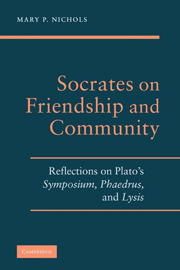Book contents
4 - Who Is a Friend? (The Lysis)
Published online by Cambridge University Press: 06 January 2010
Summary
Some years after Socrates leaves Agathon's dinner party with Aristodemus in tow, and a few years after Socrates follows Phaedrus outside the city walls to hear Lysias' speech, Socrates discusses friendship with two young boys at a palaestra. He admits to them and the others present that ever since he was young he desired to acquire friends, but he is so far from succeeding that he does not even know how one becomes the friend of another (211d-212b). If we can take Socrates at his word, he counts neither Aristodemus nor Phaedrus as a friend. When Phaedrus asks to be included in Socrates' prayer at the end of the dialogue bearing his name, because “the things of friends are common,” Socrates says only “let us go [back to the city]” (279c). Socrates' response can be contrasted with his remark at the end of the Lysis that he considers himself and his two young interlocutors to be friends (223b). At the end of the Lysis, it appears that “three go together,” and Socrates corrupts a Homeric dictum once again.
Even if Socrates has found friends by the end of the Lysis, they have not been able to discover what a friend is. The Lysis is one of Plato's aporetic dialogues, which end in perplexity (aporia) about the question discussed. Scholars have long held that Plato wrote his aporetic dialogues early when he was most influenced by Socrates' manner of questioning everything, and that he only later developed the philosophic positions we most associate with him.
- Type
- Chapter
- Information
- Socrates on Friendship and CommunityReflections on Plato's Symposium, Phaedrus,andLysis, pp. 152 - 194Publisher: Cambridge University PressPrint publication year: 2008



